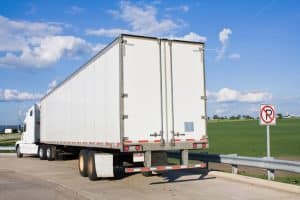We Need to Do Something About Underride Crashes – Now
 Chicago roads already host a variety of accident risks and many of us already know to avoid trucks, but not every danger is as well-known as it should be. At least, not until it’s too late and someone loses a loved one in a tragic and entirely preventable accident. As drivers with families on the freeways, we deserve to truly understand the dangers around us, and we must push lawmakers to take them seriously — even if it takes a few more bucks out of a manufacturer’s pocket.
Chicago roads already host a variety of accident risks and many of us already know to avoid trucks, but not every danger is as well-known as it should be. At least, not until it’s too late and someone loses a loved one in a tragic and entirely preventable accident. As drivers with families on the freeways, we deserve to truly understand the dangers around us, and we must push lawmakers to take them seriously — even if it takes a few more bucks out of a manufacturer’s pocket.
In this case, we’re discussing underride crashes. These often fatal collisions are almost as frustrating as they are horrific, as preventing them would be relatively simple and cheap (but not free), and instead of prioritizing our safety, NHTSA seems to be prioritizing the truck manufacturers who would have to pay. This is not okay. We need objective data and objective regulations, both for the safety of the truckers themselves and those around them. And when trucking manufacturers and companies choose to be negligent in the name of greed, their victims deserve to hold them accountable.
How do underride crashes happen, and why are they so severe?
Large trucks and tractor-trailers are obviously much bigger than other vehicles on the roads, and as such, their bumpers do not line up with smaller cars and vehicles. Since bumpers exist to take the impact of a crash and minimize damage for the driver, and since trucks are so much greater in size and mass, what happens is the smaller vehicle will literally slide under the trailer of the truck. This means the point of impact is the windshield — and that driver’s head. Whether it happens at the back or the sides of the truck, this is called an underride crash. As one can guess, these accidents are often fatal to the occupants of the smaller vehicle, or at the very least severely disabling.
Most assume that such a terrible accident is too rare to be concerned about, but this couldn’t be farther from the truth. In 2021 alone, over 400 people died in underride crashes and it is widely known among data collectors and even official agencies that such accidents are severely underreported for a variety of reasons that, frankly, aren’t much of an excuse. NHTSA did update their regulations to force trucks to have back guards to prevent underride accidents, but those guards are usually inadequate despite fitting regulation standards and they do nothing for side underrides, which are just as deadly. Side guards and stronger requirements could easily prevent a majority of these collisions, and while a newer bill passed in 2022 now mandates them on more trucks, it isn’t all of them, and they aren’t as strong as they need to be.
Because we know so relatively little about just how rampant this issue really is, spreading awareness is uniquely difficult, thus leading to more underreporting, and the vicious cycle continues from there.
Why doesn’t the NHTSA take underride crashes seriously?
It isn’t that they don’t take it seriously, per se, but they have a bit more influence from the entities they are meant to be regulating than they should. Officially, the NHTSA’s reasoning for not mandating side guards on all trucks is lacking enough data to support that the benefits (people saved) outweigh the literal cost of equipping fleets. They, of course, put the onus of that research largely on law enforcement. While NHTSA is responsible for weighing the cost-benefit of potential regulation, trucking manufacturers violently push back against anything that costs them essentially any new amount of money, no matter the safety — and NHTSA has let them.
Hundreds of people a year — at LEAST — are dying from these entirely preventable collisions because the way to prevent them isn’t free for manufacturers. Awareness is so minimal that the largest and loudest advocates for increased regulations and stronger, mandatory guards are the parents of children killed in underride crashes. While the loved ones of deceased accident victims often advocate on their family member’s behalf, these loved ones essentially have to be ambassadors, activists, and bill writers only to barely ever be listened to.
Trucking manufacturers largely say that the issue with underride guards — especially on the sides — is beyond cost, and could actually cause more dangers than it prevents, but (ironically) there just isn’t enough data to support any of that. When questioned directly in the PBS documentary, “America’s Dangerous Trucks,” a manufacturer’s VIP expertly evades responsibility and ultimately circles back to the cost being too great, and the research too small.
Trucking companies can be held accountable
This isn’t the first time manufacturers have prioritized profit over safety. A company is a company, no matter the kind, and at the end of the day, what they earn and what they spend is all they are really concerned with. Those around trucks aren’t the only ones who suffer from this, either. Truckers themselves have been quitting in droves due to unfair and unsafe working conditions, but those that can’t afford to are stuck with what’s left. This includes incentivizing drowsy driving and skipped mandatory rests, slacking on safety standards of all sorts, general overworking, and only monitoring whether or not a route has been completed instead of anything related to the driver’s safety and standard adherence.
When safety is neglected and truckers are overworked and exhausted, dangerous accidents are bound to happen. If you survive an underride truck accident in a small vehicle, the trucker may be physically okay but you will likely suffer a severe traumatic brain injury that affects the way you live for the rest of your life. And yes, it is true that truck drivers are less likely to be severely injured than the occupants of smaller vehicles they collide with, but that doesn’t mean they’re never hurt. The number of people in trucks who died in accidents has gone up an astonishing 68% since 2009, and that’s only as of 2021.
Regardless of whether the victim of the accident is the trucker or the other vehicle’s occupants, they deserve to seek compensation from the trucking manufacturer that essentially allowed the accident to happen. It can be especially difficult to go after these companies, but an aggressive and experienced truck accident attorney knows how to build a successful personal injury case or wrongful death claim on behalf of a deceased loved one. For a wrongful death case, you must file within one year of the accident — especially if you want to take advantage of the Illinois Survival Statute, which allows you to collect compensation not just for the wrongful death, but for the pain and suffering the deceased experienced before passing away.
It would be wonderful if improved mandates passed and forced trucking manufacturers to truly prioritize safety, but until that happens, there are still regulations by which they must abide. All the neglectful work conditions previously mentioned are illegal — and so is allowing their truckers to operate without the necessary training to do so safely. When this neglect leads to a deadly accident, your attorney can do everything from inspecting electronic logging devices to studying odometer reports to questioning any official off-duty driving (personal conveyance) logged by the truckers involved, and more depending on what your case requires.
Whether it’s personal injury or wrongful death, and whether you’re in Chicago or throughout Illinois, Gainsberg Injury and Accident Lawyers can help you build a strong, compelling case that gets you and your family the full extent of compensation possible. We don’t back down when trucking manufacturers get aggressive — we fight back, and we fight back better. Greed should never matter more than someone’s life, but they don’t have to get away with it even if the NHTSA lets them. For a free consultation and to learn how we can help, call us today or use our contact form. We are here for you, and we mean that.

Attorney Neal Gainsberg has spent the last 20+ years fighting to protect the rights of the injured in Chicago and throughout Illinois. For dedicated legal help with a personal injury, car accident, or wrongful death matter, contact Gainsberg Injury and Accident Lawyers in Chicago for a free consultation.
